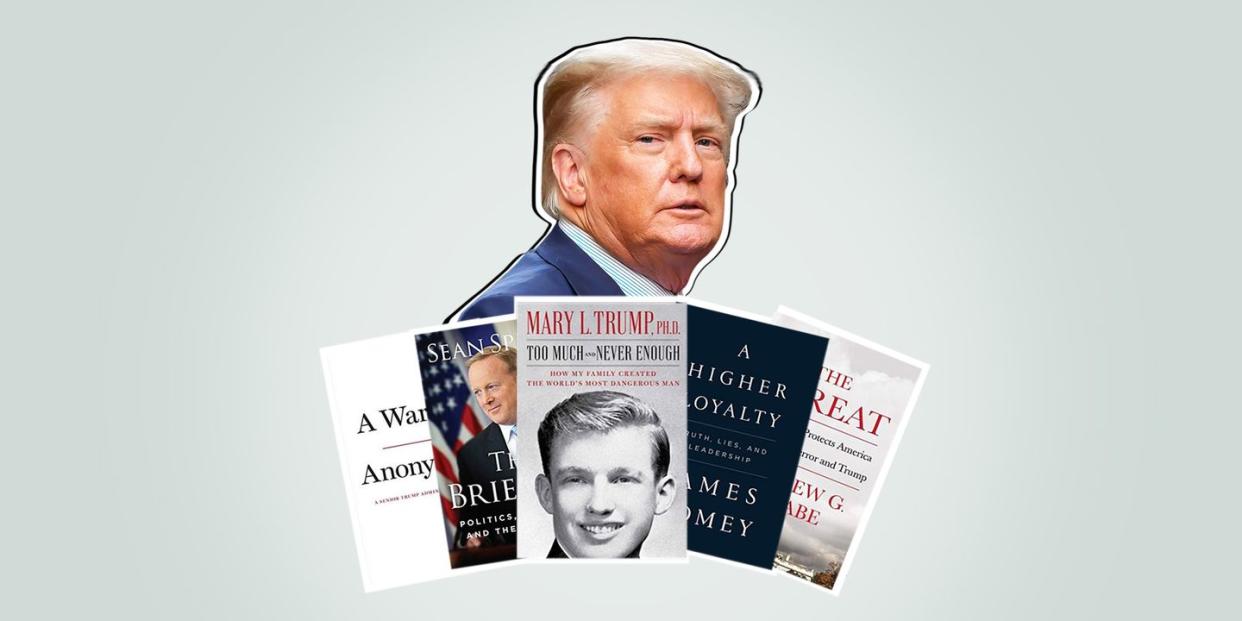Trump's Memoir Is Bringing Publishers to a Long-Overdue Reckoning With Truth

- Oops!Something went wrong.Please try again later.
- Oops!Something went wrong.Please try again later.
- Oops!Something went wrong.Please try again later.
The first ex-president to publish a memoir during his lifetime was James Buchanan, who retired from public office in disgrace in 1861, leaving behind a nation torn asunder by slavery and the impending secession of the southern states. Buchanan’s untitled memoir was abysmal, according to presidential historian Craig Fehrman, author of Author in Chief: The Untold Story of Our Presidents and the Books They Wrote. “Buchanan’s is definitely the worst presidential memoir I’ve read,” Fehrman told Smithsonian Magazine. “It’s mostly just James Buchanan trying to blame everyone except James Buchanan for the war and its aftermath.” The kicker: it was terrible, but it sold.
How fitting that Buchanan would set the precedent now reaching its apex with Donald Trump, his successor for the title of American history’s worst president. In the publishing world, Trump is regarded as an untouchable, even though his post-White House memoir would assuredly top the bestseller charts and generate a windfall for the publisher foolhardy enough to touch it. Never before has a modern president struggled to score a cushy book deal after leaving office, but as ever, Trump has notched another ignoble first. Members of the Big Five publishing houses see his memoir as a third rail, fearing that such a book would be closer to a work of fiction than memoir. Keith Urbahn, president and founding partner of the creative and literary agency Javelin, told Politico, “Any editor bold enough to acquire the Trump memoir is looking at a fact-checking nightmare, an exodus of other authors, and a staff uprising.”
Trump, for his part, claims to be writing “the book of all books,” and insists that his memoir has prestigious suitors. In a statement last Friday, he claimed to have received and rejected two offers “from the most unlikely of publishers”; in a second statement on Monday, he said, “Two of the biggest and most prestigious publishing houses have made very substantial offers, which I have rejected.” Senior sources at the Big Five tell Politico that no such offers have been extended. Speculation abounds that the “most unlikely of publishers” could include All Seasons Press, a brand new publisher whose stated mission is “to publish the best writers, politicians, and pundits in the conservative movement.” Founded by publishing veterans Louise Burke, who tried and failed to publish Milo Yiannopoulos at an imprint of Simon & Schuster, and Kate Hartson, who was fired from Center Street after publishing such Trumpworld figures as Donald Trump Jr. and Jeanine Pirro, All Seasons Press has already lined up books from Trump chief of staff Mark Meadows and Trump advisor Peter Navarro. Alexei Woltornist, who co-founded Axios and worked in Trump’s Department of Homeland Security, told The New York Times, “Conservatives are getting serious in setting up our own parallel infrastructure. We can’t be reliant on people who are hostile to our ideas to continue hosting us.”
In the wake of the Trump administration, publishing has become an island of misfit toys for Trumpworld figures. Former Vice President Mike Pence received the splashiest book deal, signing with Simon & Schuster to write two memoirs for upwards of seven figures, which reportedly “grated” on Trump and drove thousands of objectors to circulate a petition demanding that Simon & Schuster stop inking deals with Trumpworld alums. Other high profile members of the administration with books slated to appear on shelves include advisor Kellyanne Conway, former education secretary Betsy DeVos, former press secretary Sarah Huckabee Sanders, former attorney general William Barr, and former first son-in-law Jared Kushner.

Publishing has always depended on blockbuster books to finance limited run titles by lesser-known writers, but where once blockbuster conservative books meant titles by ideologues like Ann Coulter, it now means multimillion-dollar memoirs by alums of a hateful and dangerous presidential administration, who feel no fealty to truth or facts. This business model has always been precarious at best, but now, it crosses into the realm of malicious profiteering, with the moral and financial stakes higher than ever. All of this leads us to a question: in 2021, what good is the political memoir genre doing us? Political memoirs can and should exist, but the genre's current iteration operates like the Wild West, where even disgraced politicians facing criminal investigation can treat publishing as a bully pulpit for falsehoods, with a fat check as a reward.
Publishing is laboring under a long-outdated assumption: that political figures are entitled to seven-figure book deals, no questions asked. These books are selling aggressively, with sales jumping a staggering 60% between 2019 and 2020, but at what cost? The books are all too frequently ghostwritten, factually inaccurate, and, quite simply, bad. They offer little in the way of insight, analysis, or introspection; rather, they’re simply celebrations of a politician’s accomplishments, justifications for their mistakes, or efforts to control the historical record. Some political memoirs, written by the outer ring of a politician’s acolytes, are next to useless. As Fehrman said of presidential memoirs, “It’s a genre where a lot of good writers have lost the thread, become too focused on settling scores, or listing every person at a meeting.” If publishers want to collect the colossal profits these books can turn, they owe their readers due diligence on the back end to ensure high standards of quality, usefulness, and truth.
It's time to do away with the assumption that all prominent political figures have something worth saying, no edits required, to the tune of seven figures and a $27.99 hardcover. Certainly well-edited political books have value, and publishing should welcome voices from both sides of the aisle, but Democrats and Republicans both should be subject to rigorous fact-checking. Anyone who won’t agree to a good, clean fact-check should consider their right to a mainstream book deal forfeit. That said, convincing publishing to invest in fact-checking will be an uphill climb; as an Esquire investigation revealed, publishers rarely agree to finance fact-checking, and even more rarely require it as a barrier to publication. Convincing conservatives to submit to fact-checking or take a hike will be even harder, but the policy needs to cut both ways, for the good of the American public. It remains unclear if A Promised Land, Barack Obama's runaway bestseller, was subjected to fact-checking; this is every bit as concerning as the complete abdication of fact-checking with Trumpworld memoirs. Until fact-checking becomes an industry standard, this wave of half-baked, "collect your seven figure advance and pass go" political books will continue to be a blight on public life. They are not important contributions to the historical record, as some claim, but rather, they are mercenary, profit-motivated volleys at any semblance of shared objective reality. In an era of vicious mendacity, it's more important than ever that publishers take and hold a firm stance about unimpeachable (no pun intended) truth.
In Trump’s statement about his alleged offers from prestigious publishers, he went on to say of the Big Five, “Does anybody really believe that they are above making a lot of money? Some of the biggest sleezebags [sic] on earth run these companies. No morals, no nothing, just the bottom line. And they sure wouldn’t admit it before the fact. But after the fact, they will stand by and say, ‘Let’s go.’”
It might just be the first true thing he’s ever said.
You Might Also Like

